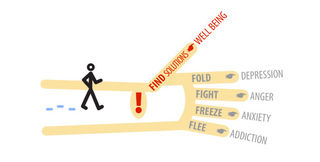Anger
Prescriptions Without Meds for Anger, Depression and Anxiety
Learn how negative feelings actually help you...and then how to ease them away.
Posted October 27, 2014

We all sometimes face tough times. When a difficult situation has landed on your life path, negative emotions like anger, depression, and/or anxiety are bound to rise up.
Taking pills to block negative feelings may block them from serving useful purposes. Pills also have downsides like spacey thinking and numb feelings, weight gain, loss of sexual interest, brain zapping, drug dependency, and more.
Here's therefore a set of alternatives to taking pills to benefit from and then chase away anger, anxiety and depression, the Big Three of negative emotional states.
Can you let the big-three negative emotions help you toward fixing a relationship or work situation? And can you then re-establish feelings of well-being?
Here's how, based on the "Heitler Hand Map" below.

The map illustrates how, as you head down the road of life, you will inevitably from time to time bump up against difficult situations, represented in the diagram by the red exclamation point. At that point you have five possible routes. You can take the detours away from well-being that lead to depression, anger, anxiety or addictions. Or you can look to Find Solutions. That problem-solving route, the Thumb Route, leads you up and back to the realm of well-being.
Here's more on the four routes to more distress.
1. Fight: Anger Road
Anger tells you that there's something you want that you are not getting, or that you are getting something that you do not want.
To become effective when you feel angry, start by taking a break to calm down. Your anger will just be helpful for identifying problems, not for solving them.
Aiming anger at others seldom helps and often hurts, hurts you and hurts the ones you are mad at.
S any time that you begin to feel frustrated or irritated, even before you feel fully mad, immediately take the pot off the stove. Would you wait once you see a pot boiling until it has boiled over to remove it from the heat? Of course not. Do the same for yourself. Remove yourself from the situation you can't handle.
Set up a Quiet Chair for yourself ahead of time so you always have a place, especially when you are at home, where you can sit until you calm down. Distract yourself with books, magazines, music, or something electronic.
Once you feel calmer, ask yourself, "What did I want in that situation?" Not, what did I want someone else to do, but what was my internal concern.
Then, think of a better way than anger to get that.
Lastly, ask yourself what the other person wanted. When you feel angry, what you want will loom large and what the person you are mad at will probably be inaudible to you. Now that you are calmer, listen again.
Remember the words of the ancient sage Hillel The Elder: If I am not for myself who will be? And if I am for myself alone, what good am I? And if not now, when?
Take care of yourself and also listen to others. Your life will be far the better for it, and your anger will then melt away.
2. Freeze: Anxiety
Anxiety signals that there is a challenging problem ahead and that your brain has frozen with regard to effective problem-solving. The anxiety will go away as soon as you find a pathway to solving the problem.
Anxiety is very helpful as a signal to look ahead to understand a potential difficulty.
Some say that the best antidote to anxiety is information. Figure out what information you need and where you might get it. Then map a plan of action for solving the problem.
3. Depression
Depression occurs when you take a submissive role in response to a conflict, letting someone or something outside of yourself have the power. Depression in this sense protects you from entering into a conflict in which you, or a relationship that is important to you, might get injured.
Once you have saved yourself from injury from giving in, your depressed feeling no longer is likely to be helpful to you. Now it's time to release the depression.
Take a deep breath. Puff yourself up until you feel very large. Then take a fresh look at the situation. What might you do differently to change the outcome?
4. Addiction
If the negative feelings described above look particularly unappealing, escape into a good-feeling habit that keeps you distracted can be tempted. Alcohol, drugs, compulsive eating, constant social media....there's lots of options on this road. The problem though is that the real problem never gets addressed.
5. Best Option: Find Solutions.
That''s the route back to the real of well-being.
Feelings first.
The bottom line is that feelings are your friends. Painful feelings are your friends in that they indicate what you need to pay attention to. Address that situation and the painful feeling is likely to disappear.
The rule "Feelings first" suggests that any time you notice yourself, or others, showing signs of having a feeling, pause and immediately address the feeling.
Feelings are like angels: they come to give us a message. As soon as you have heard and begun to act with appropriate responsiveness to the message, the feelings vanish. Pay attention to feelings, respect them, and appreciate the guidance they offer you.
---------------------------------------------------------------------

-----For more guidance on how to deal effectively with difficult emotions, see Dr. Heitler's newest book, Prescriptions Without Pills: For Relief from Depression, Anger, Anxiety and More.
See also the free worksheets and video examples at prescriptionswithoutpills.com.




